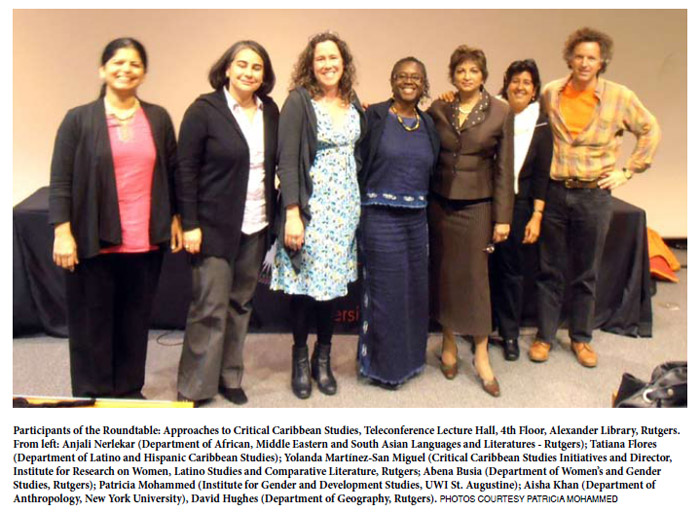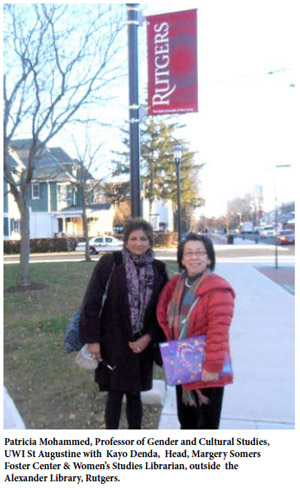|
January 2013

Issue Home >>
|


The visit to Rutgers was one of the activities planned for my sabbatical year’s leave at UWI. It was a great privilege to be invited by Rutgers, the State University of New Jersey, as our own history at UWI, though young by comparison, has some similarity. Today, with more than 58,000 students, distributed over five different physical campuses located within New Jersey, Rutgers is one of the largest and most diverse public research universities in the nation. Women and Gender Studies and Caribbean Studies have been added to an impressive menu of scholarly offerings. The cross faculty connections that hosted my visit presented a good example of the contemporary interdisciplinarity in learning communities. My first meeting with Puerto Rican born Yolanda Martinez-San Miguel (Professor in the Department of Latino and Hispanic Caribbean Studies, Jamaican born Professor Michelle Stephens, and Indian born Anjali Nerlekar of the Department of African, Middle Eastern and South Asian Languages and Literature threw some light on the nature of this collaboration. A relatively new programme called Critical Caribbean Studies supported by the Rutgers President’s Office had been initiated in 2011. This programme aimed to foster multi-disciplinary research about the Caribbean around four clusters of concern:
- Critical Caribbean Studies, Theory, and the Disciplines
- Archipelagic Studies and Creolization
- Caribbean Aesthetics, Poetics and Politics, and
- Caribbean Colonialities – a critical revision of debates on colonialism, neocolonialism, postcolonialism and decolonial thinking.
While we do not call what we do within our region Caribbean Studies, extracted from its geographical location, the umbrella of Critical Caribbean studies covers much of my work in film, visuality and gender studies and that of many of my colleagues at UWI, especially those in the Humanities and Social Sciences. The week’s events comprised several different engagements. One was a public reception and screening where two of my films “Windows to the Past” and “The Sign of the Loa” from the documentary series  “A Different Imagination” generated a lively conversation on memory, belonging and history. Several key readings from my work had been circulated in preparation for this visit. My book, “Imaging the Caribbean: Culture and Visual Translation,” was a primary text in a graduate course called Caribbean Theorizing: Coloniality, Philosophy and Literature, taught by Professor Nelson Maldonado Torres and I had the pleasure of lunch and conversation with a group of graduate students from this course at the graciously appointed Rutgers Faculty Club. A second very exciting session was the Roundtable Panel in which I was joined by two other scholars, Professor Tatiana Flores (Art History and Institute for Women in the Arts, Rutgers) and Professor Aisha Khan (Anthropology, New York University) as we addressed the broad theme of Approaches to Critical Caribbean Studies. “A Different Imagination” generated a lively conversation on memory, belonging and history. Several key readings from my work had been circulated in preparation for this visit. My book, “Imaging the Caribbean: Culture and Visual Translation,” was a primary text in a graduate course called Caribbean Theorizing: Coloniality, Philosophy and Literature, taught by Professor Nelson Maldonado Torres and I had the pleasure of lunch and conversation with a group of graduate students from this course at the graciously appointed Rutgers Faculty Club. A second very exciting session was the Roundtable Panel in which I was joined by two other scholars, Professor Tatiana Flores (Art History and Institute for Women in the Arts, Rutgers) and Professor Aisha Khan (Anthropology, New York University) as we addressed the broad theme of Approaches to Critical Caribbean Studies.
Classroom visits to two courses, first Introduction to Caribbean Studies taught by Professor Kathy Lopez and Caribbean Pluralities and Indo-Caribbean Literature taught by Professor Anjali Nelekar demonstrated the growing interest of a wide range of students, many not directly linked to the Caribbean in Caribbean studies.
The visit allowed other academic explorations: a visit to the Mason Gross School of Arts which houses the prestigious film programme of Rutgers; one to the Alexander Library where I was assisted by Rutgers’ librarian Kayo Denda for material related to my current research on Irish/US/Caribbean migration. There was also a chance to meet up again with Professor David Hughes a Rutgers geographer who’d spent his sabbatical year at UWI.
I returned to Trinidad, re-energized by the collegiality I found at Rutgers, by the generous sharing of ideas and the close and critical interrogation of my work by a group of distinguished scholars outside of the region. The exchange brought me back to a question that I had posed during my elected year as President of the Caribbean Studies Association in 2008. How do we centre the Caribbean in Caribbean Studies? The Critical Caribbean Studies Cluster at Rutgers opens up a valuable space for dialogue between scholars in the region and those who examine it from a distance, a middle ground for the meeting of perspectives and sharing of insights. Rutgers has opportunities for publishing and post doctoral visits that should appeal to Caribbean based scholars. Yolanda Martinez-San Miguel extended an invitation to manuscripts for the Rutgers University Press book series in Critical Caribbean Studies (see link for more details: http://www.yolandamartinez-sanmiguel.com/rutgers-university-press-book-series-in-critical-caribbean-studies.html) and to interested young scholars to apply for Post-doctoral fellowships (see http://www.yolandamartinez-sanmiguel.com/postdoctoral-fellowship-in-critical-caribbean-studies-at-rutgers.html)
|





